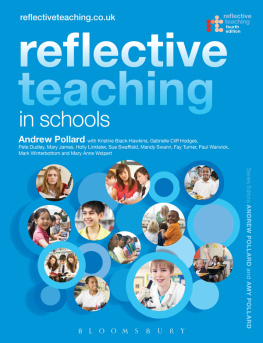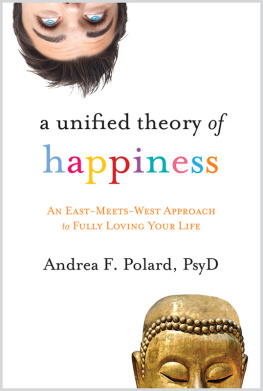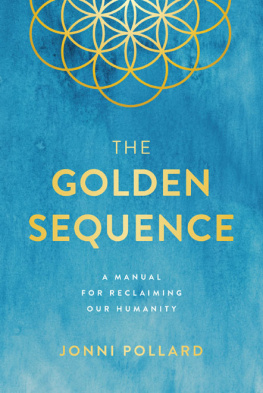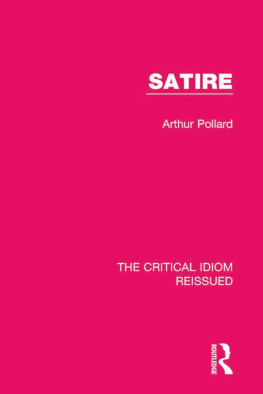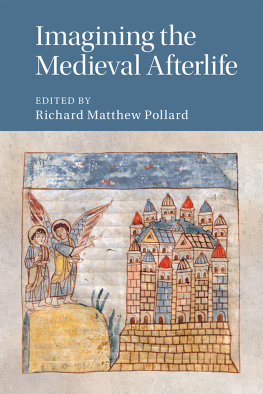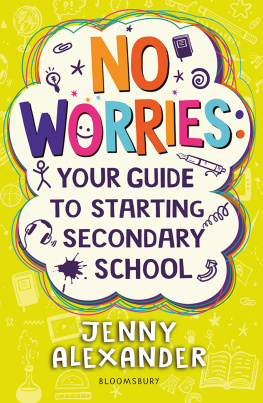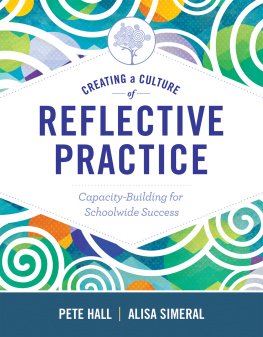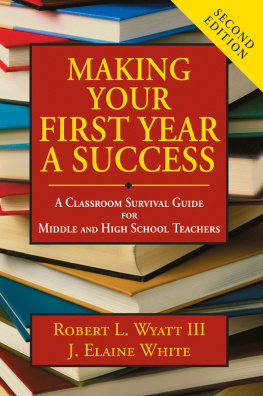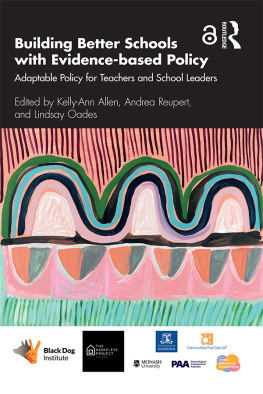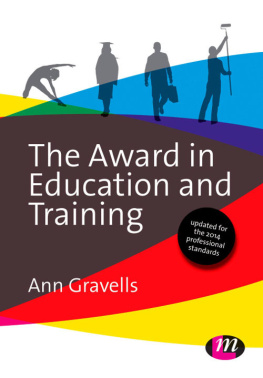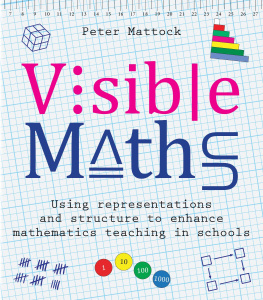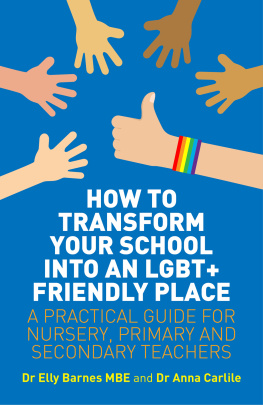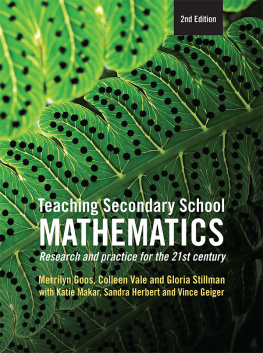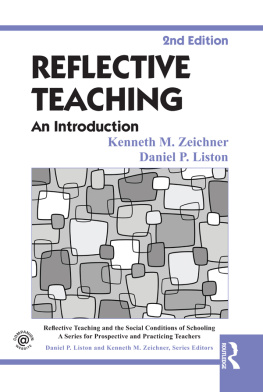reflective
teaching
in schools
4th edition
Available and forthcoming titles in the Reflective Teaching Series
Series Editors: Andrew Pollard and Amy Pollard
Readings for Reflective Teaching in Schools (2 nd edition) , edited by Andrew Pollard
Reflective Teaching in Further and Adult Education (3 rd edition) , Yvonne Hillier
Forthcoming titles:
Reflective Teaching in Early Education, Jennifer Colwell et al.
Readings for Reflective Teaching in Early Education , edited by Jennifer Colwell and Andrew Pollard
Reflective Teaching in Higher Education , Paul Ashwin et al.
Reflective Teaching in Further, Adult and Vocational Education , Margaret Gregson, Yvonne Hillier et al.
reflective teaching
in schools
4th edition
Andrew Pollard
with Kristine Black-Hawkins, Gabrielle Cliff Hodges, Pete Dudley, Mary James, Holly Linklater, Sue Swaffield, Mandy Swann, Fay Turner, Paul Warwick, Mark Winterbottom and Mary Anne Wolpert
Bloomsbury Academic
An imprint of Bloomsbury Publishing Plc
50 Bedford Square | 1385 Broadway |
London | New York |
WC1B 3DP | NY 10018 |
UK | USA |
www.bloomsbury.com
Bloomsbury is a registered trade mark of Bloomsbury Publishing Plc
First published 2014
Andrew Pollard and Contributors, 2014
Andrew Pollard and Contributors have asserted their right under the Copyright, Designs and Patents Act, 1988, to be identified as Author of this work.
All rights reserved. No part of this publication may be reproduced or transmitted in any form or by any means, electronic or mechanical, including photocopying, recording, or any information storage or retrieval system, without prior permission in writing from the publishers.
No responsibility for loss caused to any individual or organisation acting on or refraining from action as a result of the material in this publication can be accepted by Bloomsbury or the author.
British Library Cataloguing-in-Publication Data
A catalogue record for this book is available from the British Library.
ISBN: 978-1-4411-7539-7
Library of Congress Cataloging-in-Publication Data
A catalog record for this book is available from the Library of Congress.
Typeset by Fakenham Prepress Solutions, Fakenham, Norfolk NR21 8NN
This book is dedicated to Anne and Michael Pollard, and to the generation who lived and worked in the 20th century to create more productive, inclusive and balanced societies in the UK.
Beyond its prime audience of teachers and trainee teachers, it is also respectfully offered to all politicians and others who need to understand why they must support and trust education professionals if they really want to promote learning for the 21st century.

Supplementary chapters at reflectiveteaching.co.uk

Mentoring Learning through mentoring in initial teacher education
Enquiry Developing evidence-informed practice
12Communication How does use of language support learning?
Supplementary chapters at reflectiveteaching.co.uk

Starting out Learning as a newly qualified teacher
Improvement Continuing professional development
T his book offers two levels of support for initial teacher education and continuing professional development.
Comprehensive guidance is offered on key issues in classroom practice including relationships, behaviour, curriculum planning, learning and teaching strategies, assessment processes and evaluation.
Uniquely, the book also introduces evidence-informed principles and concepts to support a deeper understanding of teacher expertise.
Reflective Teaching thus supports both initial school-based training and extended career-long professionalism for both primary and secondary school teachers.
Developed over three decades, the book, companion reader and website represent the accumulated understanding of generations of teachers and educationalists.
Readings for Reflective Teaching in Schools provides a compact library which complements and extends the chapters in this book. It has been designed to provide convenient access to key texts and will be of particular help when library access may be difficult.
The associated website, reflectiveteaching.co.uk  , offers an enormous range of supplementary resources including reflective activities, research briefings, advice on further reading and additional chapters. It also features a compendium of educational terms, a conceptual framework showcasing some of the UKs best educational research and extensive links to useful websites.
, offers an enormous range of supplementary resources including reflective activities, research briefings, advice on further reading and additional chapters. It also features a compendium of educational terms, a conceptual framework showcasing some of the UKs best educational research and extensive links to useful websites.
Underlying these materials, there are three key messages. The first is that it is now possible to identify teaching strategies which are more effective than others in most circumstances. Teachers therefore now have to be able to develop, improve, promote and defend their expertise by marshalling such evidence and by embedding enquiry and evaluation within routine practices. Second, all evidence has to be interpreted and we do this by making sense. In other words, as well as information about effective strategies we need to be able to discern the underlying principles of learning and teaching to which specific findings relate we need to understand what is going on in this complex area of professional activity. Finally, we need to remember that education has moral purposes and social consequences. The provision we make is connected to our future as societies and to the life-chances of the children and young people with whom we work. The issues require very careful consideration.
Reflective activity is thus of vital importance to the teaching profession:
it underpins professional judgement and its use for worthwhile educational purposes;
it provides a vehicle for learning and professional renewal and thus for promoting the independence and integrity of teachers;
above all, it is a means to the improvement of teaching, the enhancement of learning and the steady growth in standards of performance for both schools and national education systems.
We hope that you will find these materials helpful in your professional work and as you seek personal fulfilment as a teacher.
A summary of the book follows.
Andrew Pollard
Bristol, Cambridge, London, June 2013
PART 1: BECOMING A REFLECTIVE PROFESSIONAL introduces and structures the activity of becoming a teacher. We start in ). These come from a major UK research and development programme and also draw on accumulated evidence from around the world. Measured effects of particular strategies are related to underlying principles.
Two supplementary chapters are available on reflectiveteaching.co.uk  on school-experience and mentoring for initial training (Mentoring) and on how to conduct small-scale enquiries to achieve an evidence-informed classroom (Enquiry).
on school-experience and mentoring for initial training (Mentoring) and on how to conduct small-scale enquiries to achieve an evidence-informed classroom (Enquiry).

